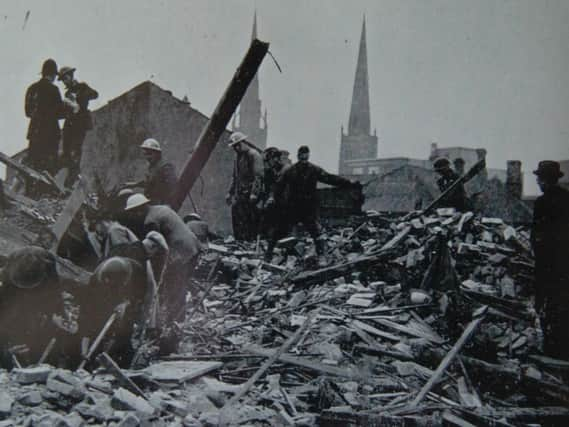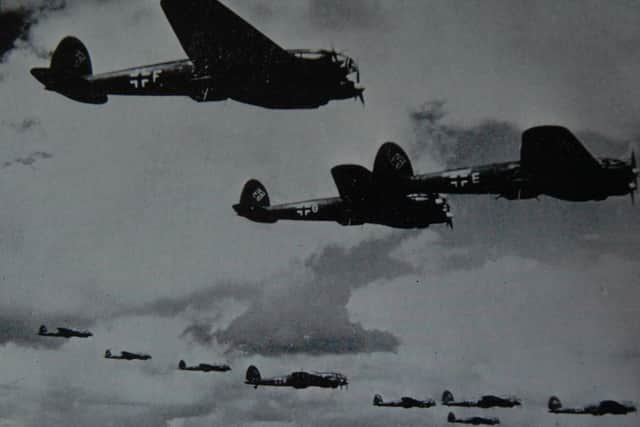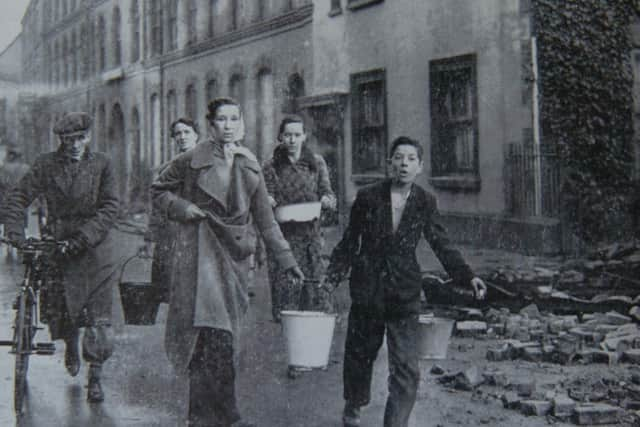The pilot who fired on children and the warden forced to end a woman's agony - Rugbeians share harrowing tales of the Blitz


From children being machine-gunned in the street to an Air Raid Warden being forced to kill a woman to end her agony, two Rugbeians have shared their harrowing memories as we mark 80 years since the start of the Blitz.
Readers are advised that some of the following accounts contain details that may upset some people - but we have chosen to publish them in full to convey the suffering that ordinary people had to endure - and the bravery they conjured up in the face of it.
Advertisement
Hide AdAdvertisement
Hide AdLinda Bromley turned 85 earlier in September - meaning she was four years old when war broke out


She lives in Rugby now, but spent much of her childhood in Coventry.
Recounting a close brush with death at the hands of a Luftwaffe pilot, she said: "My mother had been to the shop and bought a coat. When she tried it on she didn't like it.
"At that time the shelter in our garden was flooded, so she went to the next-door neighbour and said, 'can you let my children in if the siren goes off?'.
Advertisement
Hide AdAdvertisement
Hide Ad"She went out to town and the siren went off, there was an ack ack gun in the field behind the house


"When the siren went off we dashed next door.
"The neighbour opened her door but once her daughter was inside, without thinking, she slammed the door shut - leaving me and my sister out on the street.
"My sister had been doing the laundry, and of course there were no washing machines in those days, so she had soap all over her hands and she just couldn't get the front door open.
Knowing the terrible danger they were in, Linda's sister Elaine then tried to have to the two of them dash round the side of the house to use another door to get in.
Advertisement
Hide AdAdvertisement
Hide AdLinda said: "This plane had just bombed a run of shops up the road."
They were running along a low brick wall to the side of the house when a German aircraft began making for them.
"He was so low, he was trying to keep down from the ack ack gun - we could see he'd already been hit.
"We could see him, his leather helmet and goggles.
"He must have been able to see that we were two kids."
In a split second, the pilot opened fire at the two girls, sending bursts of machine gun rounds at them.
Advertisement
Hide AdAdvertisement
Hide Ad"My sister jumped on top of me. The bullets hit the wall - they were very close to us."
The high-calibre machine gun rounds missed the girls but splattered against the wall next to them, gouging chunks out of the brickwork.
"We were so lucky that he was a terrible shot."
The pilot might have missed the two girls, but Coventry's anti-air crews did not miss their target.
Severely-damaged, the plane crashed on land not very far away from Linda's home.
Advertisement
Hide AdAdvertisement
Hide AdLinda was later told that out from the wreckage emerged a man, probably aged 19 or 20, crying as he was captured.
"He said his superiors had told him that English people were half-starving and that if they got hold of him they would eat him."
"We were the enemy. But I don't believe one of our boys would have done the same thing in that situation.
When asked what she might want to say to him now, Linda said: "I would say to him, I hope God treated you better than you treated us."
Advertisement
Hide AdAdvertisement
Hide AdBy day Linda's father Alfred Wright worked in a factory producing sheet metal parts for aircraft.
By night he served as an Air Raid Warden, risking his life to save strangers.
"He was only getting two or three hours of sleep each night.
"When I was much older he told me some of the things he'd seen.
Advertisement
Hide AdAdvertisement
Hide Ad"He was out one night with his mate and they saw a woman crawling along the floor with all her innards hanging out.
"He said she looked like she'd been on a butcher's hook."
The raids often overwhelmed emergency services and knocked out any means of phoning for medical help.
"His mate took a brick and hit her with it. There was nothing else they could have done for her."
"Once he saw a baby's head in one front garden and its body in another.
Advertisement
Hide AdAdvertisement
Hide Ad"One night a few of them were sat round in a circle having a cup of tea and my father said he heard a 'whoosh'.
"It was a stray bit of shrapnel - it hit the warden sat opposite him and took his head clean off while his son was sat next to him."
Linda said the air raids quickly took their toll on residents.
She said: "One night a warden came to check on us in our garden shelter.
Advertisement
Hide AdAdvertisement
Hide Ad"His hand were wounded and my mum told him we had bandages and we would help him.
"He said no and walked out - then he shot back into the shelter and collapsed in a heap on the floor.
Linda and her family quickly found out that the warden had been startled by an owl shrieking nearby.
"We all laughed," she said.
Explaining what some may think an odd reaction, Linda said: "Everyone's nerves were shot by then.
Advertisement
Hide AdAdvertisement
Hide Ad"My sister developed a facial twitch that took years to go away."
Linda, who became a classically-trained singer later in life, recalls keeping morale in the shelters up by singing Vera Lynn's hits to people as they sheltered from the bombing.
"My favourite was We'll Meet Again," she said.
Val East, now 80 and living in Rugby, was born in Coventry when the Blitz began.
"My late husband and I ran the Rose and Crown in Coventry for years, the city means a lot to me."
Advertisement
Hide AdAdvertisement
Hide Ad"I spent the first three months of my life being hidden under tables and under the stairs," she said.
After those three months her parents moved back to their home town of Northampton to escape the air raids.
Her father, Percy Allen, continued to take the train to Coventry, where he worked at the Daimler and Matrix factories producing parts for Lancaster bombers.
One evening in 1940 Percy, known as 'Titch' because he was around five-feet tall, arrived in Coventry station and prepared to make his way to start his shift.
Advertisement
Hide AdAdvertisement
Hide AdHe was stopped by a burly police constable and told to get into the back of a police wagon.
Val said: "I can picture it now, he would have said, 'I haven't done anything wrong, I'm not getting in the back of a Black Mariah."
Percy had indeed done nothing wrong - he was being summoned to help the authorities cope with the air raids.
That night, November 14, saw the infamous Luftwaffe raid, codenamed 'Moonlight Sonata' - which was to be the most intense German bomb attack on a British city of the entire war.
Advertisement
Hide AdAdvertisement
Hide AdVal said Percy spent the night desperately trying to help the injured.
She said: "He later told me that the one that really upset him was digging a young nurse out of rubble - she was dead when they got to her."
Percy then had to walk home during the early hours and, while walking past a now-demolished pub close to Ryton-on-Dunsmore, he came across a headless body.
The same devastating tactics used by the Luftwaffe on the people of Coventry early in the war were then perfected and used to devastating effect on German civilians as the Third Reich became increasingly incapable of resisting Allied air raids.
Advertisement
Hide AdAdvertisement
Hide AdIn 1959 Coventry was twinned with Dresden, the German city which lost tens of thousands of civilians to Allied air raids.
Representatives from the two cities often meet together to see that the suffering of civilians on all sides are not forgotten.
"We must keep teaching about the Blitz in schools," Linda said.
"We can't ever forget what happened."